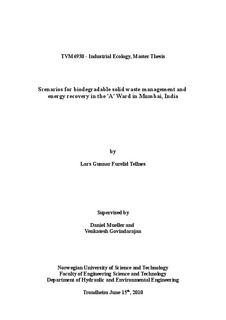| dc.description.abstract | Introduction. Mumbai is one of the most highly-populated cities in the world and the commercial capital of India. Every day, about 6500 tons of municipal solid waste (MSW) and 2500 tons of construction and demolition waste are generated. The collection efficiency in Mumbai is relatively high for an Indian city, but there is a paucity of space for landfilling.. With the introduction of the Municipal Solid Waste (Management & Handling) Rules, 2000, biodegradable wastes could not be landfilled without prior processing.. To find a solution to this, the Municipal Corporation of Greater Mumbai (MCGM) entrusted a consultancy with the task of determining solutions to the city's waste treatment challenges in the short-, medium-, and long-term. The report, which was readied in year- 2006 recommended the capping of the currently-operating landfills accompanied by landfill-gas (methane) capture, financed through the clean development mechanism. Further, it advised the MCGM to compost 6000 tons of mixed MSW and subject 500 tons of separately-collected market and restaurant wastes to biomethanation daily. The latter solution originates from the MSW rules which state that this fraction should be separately collected and used. This solution would also incur the lowest tipping fees.. Thus, centralised solutions can be beneficial and also more economical. The reaction to there recommendation has been from many that the civil societies role in waste handling have been rejected and that decentralised solutions are more beneficiary and cheaper.
Objectives. This study has therefore focused on decentralised and on-site treatment solutions of biodegradable solid wastes, in preference to the conventional, in-vogue centralised solution. The peninsular tip of the city which is an affluent area of Mumbai – the A ward – was selected as the study area. If treatment of waste could be commercially viable, was the driver behind the study.
Methods. Material flow analysis of the flow of biodegradable waste has been applied as a basis for this study. Material flow cost accounting has also been carried out. A stakeholder analysis has been performed in order to understand how the system would be influenced by differing perceptions and interests of the stakeholders associated with it. Scenario for treating all the waste of 'A' ward onsite, decentralised and centralised was compared to the current situation.
Results. Commercial and institutions were the largest generators in the 'A' ward, and was closely followed by the residences. The generators of waste were the primary stakeholders and the waste managers were the secondary. If all the waste were to be treated on-site of generation, the net cost of SWM services would almost be eliminated. Decentralised and centralised solution had almost the same net cost. On-site or decentralised treatment would require 0.3% of the total area of 'A' ward.
Conclusion. The MSW rules which came into force in year-2000 address the health, hygiene and environmental goals quite satisfactorily and degree of compliance to these rules is a good proxy for the level of hygiene and environmental upkeep. In a low-income country, cost-efficiency of SWM services is crucial. Were labour is cheap, costs could also serve as indicator of resource conservation. It should also be mentioned that resource recovery also has several economic, environmental and social side-benefits as well. Tools of industrial ecology like material flow analysis are important for decision support regarding this, however in depth study of the objectives and context of the study should be conducted before deciding on the method. | nb_NO |
